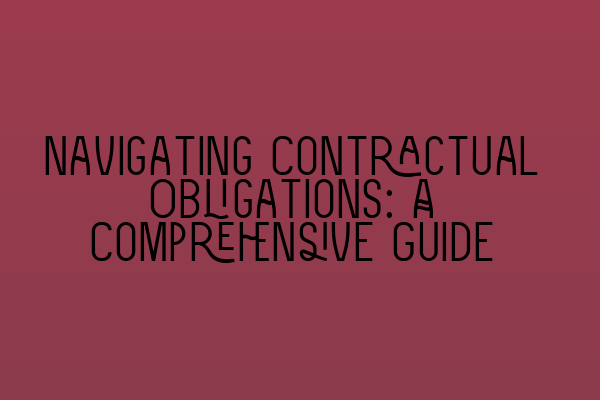Navigating Contractual Obligations: A Comprehensive Guide
In the ever-evolving landscape of business and commerce, contracts play a crucial role in defining the rights and responsibilities of parties involved. From small agreements to complex legal documents, understanding and navigating contractual obligations is essential for any individual or organization.
Whether you’re a solicitor, business owner, or simply someone looking to expand your knowledge, this comprehensive guide will equip you with the knowledge and tools to effectively navigate contractual obligations.
1. What are Contractual Obligations?
Contractual obligations are the legally binding promises and duties that individuals or organizations are obligated to fulfill as outlined in a contract. These obligations serve as the foundation for the relationship between parties and ensure that each party meets their agreed-upon responsibilities.
2. Elements of a Contract
Before diving into contractual obligations, it’s important to understand the essential elements of a contract. These elements include an offer, acceptance, consideration, intention to create legal relations, capacity, and certainty. Each element must be present for a contract to be valid and enforceable.
3. Types of Contractual Obligations
There are various types of contractual obligations that may arise depending on the nature and purpose of the contract. The most common types include:
– Performance Obligations: These obligations require parties to fulfill specific tasks or deliver on agreed-upon goods or services. Failure to meet performance obligations can lead to a breach of contract.
– Payment Obligations: Payment obligations are often a central aspect of contracts, requiring one party to provide payment in exchange for goods, services, or other considerations.
– Confidentiality Obligations: In certain contracts, parties may be obligated to maintain confidentiality and protect sensitive information shared during the course of their relationship.
– Warranty Obligations: Warranty obligations ensure that goods or services provided meet certain quality standards or specifications. Parties may be required to rectify any defects or issues that arise.
– Termination Obligations: Contracts may include provisions for termination, detailing the circumstances and procedures for ending the contractual relationship.
4. Responsibilities and Remedy for Breach of Contract
When one party fails to fulfill their contractual obligations, it is considered a breach of contract. In such situations, the non-breaching party may seek legal remedies to enforce the contract or claim damages. Remedies may include specific performance (compelling the breaching party to fulfill their obligations), compensation for losses incurred, or cancellation of the contract.
5. Risk Management and Mitigation
To navigate contractual obligations effectively, it is crucial to adopt a proactive approach to risk management and mitigation. This involves identifying potential risks, drafting clear and precise contract terms, and implementing mechanisms to mitigate or address risks should they arise.
6. The Role of Legal Professionals
Engaging the services of a solicitor can significantly enhance your ability to navigate contractual obligations successfully. Solicitors have the expertise and experience to draft, review, and negotiate contracts, ensuring that your rights and interests are protected. They can also provide valuable advice and guidance in the event of a breach or dispute.
7. Keeping Up with Developments in Contract Law
Contract law is not static, and staying updated with legal developments is essential. Regularly reviewing relevant case law and legislation can help you better understand and apply contractual obligations in light of any changes in legal principles or interpretations.
Conclusion
Contracts are the backbone of commercial relationships, providing a framework for parties to operate within. Understanding and effectively navigating contractual obligations is crucial for managing risks, ensuring compliance, and protecting your rights and interests.
By familiarizing yourself with the elements of a contract, types of contractual obligations, and potential remedies for breach, you can better navigate the complexities of contract law. Engaging the services of a solicitor can further strengthen your position and provide expert guidance throughout the contractual process.
Remember, contract law is a dynamic field, and staying updated with developments is vital. Continuously expanding your knowledge and seeking professional advice where necessary will enable you to confidently navigate contractual obligations, safeguard your interests, and foster successful business relationships.
Related Articles:
– SQE 1 Practice Exam Questions
– SQE 1 Practice Mocks FLK1 FLK2
– SQE 2 Preparation Courses
– SQE 1 Preparation Courses
– SRA SQE Exam Dates
